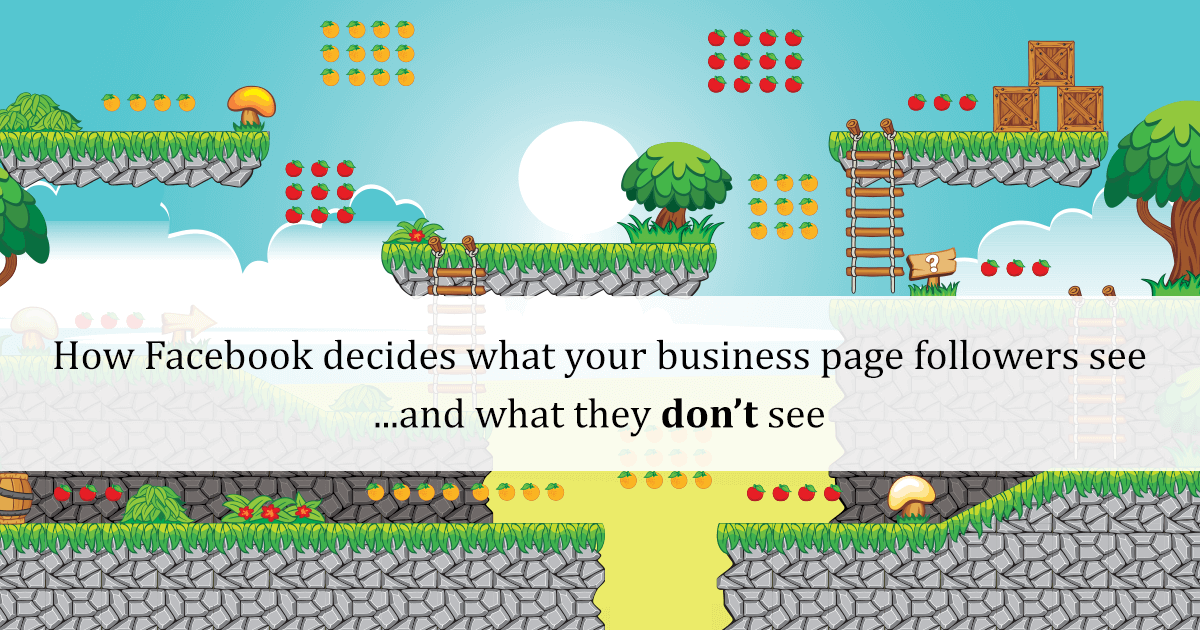
Many business owners lament Facebook’s constantly changing algorithms, especially as the apply to Facebook’s business pages – you will find that your business posts are vastly less visible to the average use than are the posts you make from your personal Facebook profile. But conducting business from your personal profile isn’t a good option for most of us — you’ll end up losing friends and potentially getting banned from Facebook!
Mastering the complex and changing rule-set that Facebook requires of businesses to gain visibility feels confusing, time consuming, and maybe even impossible! But you know what else has complicated rules and ever-changing environments that most of us still engage with enthusiastically? Video games.
The Facebook game has some very clear rules. And though they might change the rules a little bit here and there (underwater level, anyone?), the logic behind those rules stays essentially the same.
Learning the rules of the Facebook game
 Remember: Facebook is a for-profit corporation. Facebook’s objective is to get people to visit Facebook more often, and to make each of those visits last longer, because more time on Facebook means that person gets exposed to more ads. More advertising means more money for Facebook. No matter what else they do, this is always true. To achieve this they try to show people content that will evoke strong emotionally responses from them; ideally, positive emotions, but they’ll take negative emotions too if it keeps those people on Facebook longer!
Remember: Facebook is a for-profit corporation. Facebook’s objective is to get people to visit Facebook more often, and to make each of those visits last longer, because more time on Facebook means that person gets exposed to more ads. More advertising means more money for Facebook. No matter what else they do, this is always true. To achieve this they try to show people content that will evoke strong emotionally responses from them; ideally, positive emotions, but they’ll take negative emotions too if it keeps those people on Facebook longer!
When using Facebook, you are almost never shown every post that your friends make. Instead, things that Facebook think will engage you are made very obvious to you, and things that Facebook thinks will frustrate you are hidden from view. By tracking what you “react” to (through the iconic like button, or its newer compatriots such as love, anger, sadness, etc.), which posts you read the entirety of and which you scroll past, what links or ads you click on, and what sort of topics you post about, Facebook’s algorithm learns detailed information about what interests you and then tries to show you more of that type of thing. If you always like pictures of cats when they go by in your feed, you’ll soon find that you see more pictures of cats. If you hide posts about a particular political party you dislike, you will naturally be shown fewer and fewer posts about that political situation or party.
 This means that even as a regular person, you are playing the “Facebook game” — you may start to catch on that certain types of posts get more attention in the form of likes and comments, and avoid posting about the things you know never seem to delight your friends.
This means that even as a regular person, you are playing the “Facebook game” — you may start to catch on that certain types of posts get more attention in the form of likes and comments, and avoid posting about the things you know never seem to delight your friends.
But as a business, you’re playing this game on hard mode. Why?
- Most people want to see fewer ads, not more
- Most businesses want to post as many advertisements as they can
- Facebook primarily makes its money through selling advertisements
- If you get unlimited free advertising (by being allowed to post anything you like without restriction or penalty), then Facebook won’t get advertising money from you, but even more importantly…
- If you used your business page to post nothing but ads, then the Facebook experience would be less interesting to individual users.
- That means that those individuals might spend less time on Facebook, meaning they get shown fewer paid ads, which means Facebook also makes less money off of them, too!
Just like your own company, Facebook wants to maximize its profit and isn’t in the business of giving away its product for free. Its rules are designed to protect their bottom line, not yours. If you try to rebel and post only advertisements on your business Facebook page, you’ll soon learn that the house always wins as your posts are shown to 0 followers.
This can feel like hard news if you think of your Facebook page primarily as a method of advertisement. In our next post on this subject, we’ll talk about how to “win” the Facebook game, and turn this bad news on its head.






Leave A Comment